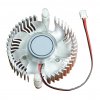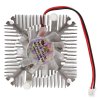So, I've been doing a lot of reading over the last couple of weeks and while there's pretty extensive stuff on the ConnectX-3 cards, the ConnectX-4 stuff is a bit spotty.
I have two genuine CX-4131A-BCAT cards and one CX-4131A-GCAT card, obviously the GCAT is a 50Gbe card and reports itself as this using ethtool.
I have a couple of QSFP28 transceivers and some OM4 fibre cabling so am now ready to try things out.
I'm running Fedora so have installed mstflint from the repos and mlxburn from the Nvidia site.
The concern I have is that from what I've read the way to flash a 'genuine' firmware from the same card family was changed from ConnectX-3 to ConnectX-4 cards, I've read that I may now need to use a --allow-psid-change flag for example and also I may need to short out two pins, however my concern is that as I haven't been able to find a comprehensive ConnectX-4 upgrade post, I may well be missing other things as well.
I've google searched the site and while there are numerous posts that talk about the ConnectX-4 cards, because it's often in the context of (paraphrased) '....you do this for ConnectX-3, however I think this might have been changed for ConnectX-4....' it means I'm never going to be certain I've not missed reading something critical hidden away in a post I missed and I'd really rather not brick my cards if I can avoid it.
The BCAT cards report as firmware 14.12.1240 on 2.11.2015 with a PSID of MT_2430110027
the GCAT I can't read right now as Secure boot is still enabled on that box and it's running a job till Saturday when I can take it offline.
So, any help or pointers you can give would be much appreciated, this has been a great learning experience thus far, but I realise I'm probably just only slightly past the start of this journey.
I have two genuine CX-4131A-BCAT cards and one CX-4131A-GCAT card, obviously the GCAT is a 50Gbe card and reports itself as this using ethtool.
I have a couple of QSFP28 transceivers and some OM4 fibre cabling so am now ready to try things out.
I'm running Fedora so have installed mstflint from the repos and mlxburn from the Nvidia site.
The concern I have is that from what I've read the way to flash a 'genuine' firmware from the same card family was changed from ConnectX-3 to ConnectX-4 cards, I've read that I may now need to use a --allow-psid-change flag for example and also I may need to short out two pins, however my concern is that as I haven't been able to find a comprehensive ConnectX-4 upgrade post, I may well be missing other things as well.
I've google searched the site and while there are numerous posts that talk about the ConnectX-4 cards, because it's often in the context of (paraphrased) '....you do this for ConnectX-3, however I think this might have been changed for ConnectX-4....' it means I'm never going to be certain I've not missed reading something critical hidden away in a post I missed and I'd really rather not brick my cards if I can avoid it.
The BCAT cards report as firmware 14.12.1240 on 2.11.2015 with a PSID of MT_2430110027
the GCAT I can't read right now as Secure boot is still enabled on that box and it's running a job till Saturday when I can take it offline.
So, any help or pointers you can give would be much appreciated, this has been a great learning experience thus far, but I realise I'm probably just only slightly past the start of this journey.
Last edited:

